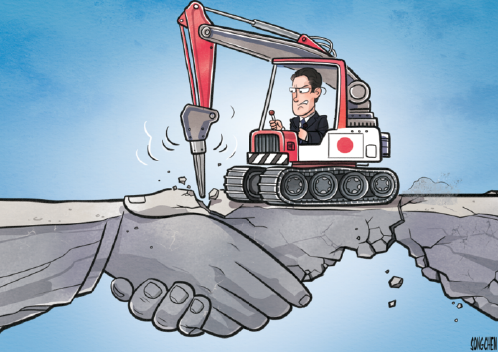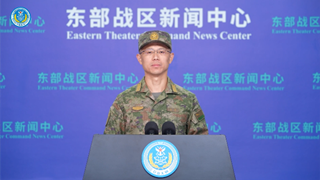
SONG CHEN/CHINA DAILY
By Xiang Haoyu
Japanese Prime Minister Fumio Kishida appears on the cover of the May edition of Time magazine along with a text that reads: "Prime Minister Fumio Kishida wants to abandon decades of pacifism — and make his country a true military power."
The cover story inside, however, says "some believe that Japan's rearmament chafes with Kishida's longstanding pledges to work toward a nuclear-free world", especially because he was born in Hiroshima.
Despite Japan formulating a pacifist Constitution after the end of World War II and vowing to adhere to peace and development, the country is no longer a "peaceful country" even in the eyes of its most intimate ally, the United States.
Kishida worked really hard trying to make the three-day G7 Summit in his hometown of Hiroshima that concluded on Sunday a success.
The three main features of Japan's G7 diplomacy are: condemning Russia, containing China, and winning over the Global South. However, Japan's efforts to win over the Global South to its side failed, making it difficult for the G7 to be included in its summit declaration.
True, the purported goal of the G7 Summit was to build an "ideal", nuclear-free world. But when it comes to denuclearization and disarmament, the G7 resorts to double standard, using different sets of rules to judge the actions of the United States, the United Kingdom, France, Japan and other advanced countries on the one side, and those of China and Russia on the other.
So when Japan says it wants to play a leading role in addressing global problems, it actually means that it wants to manipulate geopolitical issues and provoke bloc confrontation.
As Japan is the only Asian member of the G7, some Japanese politicians claim that the country has been playing the role of "Asian spokesman for global leaders", because of its "ideological superiority".
Hiroshima is one of the two cities in the world that has suffered a nuclear attack. So Kishida used that to promote the idea of creating "a world without nuclear weapons" at the G7 Summit, and assume the global leadership in nuclear disarmament.
Paradoxically, Kishida's Cabinet has approved the revision of three national security documents, which authorizes Japan to launch (preemptive) "counter-strikes" against enemy bases. Also, Kishida's government has approved a record increase in Japan's defense budget, signaling a radical shift in Japan's postwar defense and security policy.
The defense strategy of Kishida, considered a dove by many, is actually more aggressive than that of the hawkish Shinzo Abe, Japan's longest serving prime minister who was assassinated last year in Nara, Honshu.
Kishida's efforts to militarize Japan in order to counter non-existent external threats have created a sense of déjà vu among some Japanese scholars, who say the atmosphere in Japan today seems similar to that in the 1930s when Japan launched its most aggressive, brutal expansionist move.
Hence, when G7 leaders pay their respects to the victims of Hiroshima and Nagasaki, they should not forget the main reason behind the tragedy.
Japan's pacifist Constitution exists only in name today, as the Kishida administration intends to allocate 2 percent of Japan's GDP to the defense budget by 2027, which is a 60 percent increase over the present amount. That the move will make Japan's defense budget the third-largest in the world shows Japan is on the way to becoming a military power again, and once again its target is China.
The G7 Summit discussed a lot of China-related issues including China's so-called use of "economic coercion", and devoted much time to find ways to contain China's rise. This is not surprising, considering that all G7 members, except Japan, are also members of the North Atlantic Treaty Organization, and Japan has been strengthening its ties with NATO since last year.
In fact, NATO is planning to open a liaison office in Tokyo, its first in Asia. And Japan seems eager to act as a catalyst to NATO's expansion in the Asia-Pacific.
But Japan's efforts to build an anti-China alliance risk triggering divisions, which could lead to confrontations in the region.
Worse, Japan and its Western allies, especially the US, have been claiming there is a "similarity" between the Ukraine crisis and the Taiwan question, which is a lie. But people who do not know the full cross-Taiwan Strait history may be fooled into believing that lie. The truth is, there is only one China, and Taiwan is an integral part of China — only that Japan colonized the island for 50 years, from 1895 to 1945.
Therefore, the international society should condemn Japan's attempt to use the G7 Summit to peddle lies. When the G7 was established in the 1970s as a grouping of major industrialized countries, its aim was to promote good global governance, particularly in the field of macroeconomics, because the G7's share of global GDP at the time was about 60 percent.
But today, the G7's share of the global economy has dropped to 40 percent thanks to the dramatic rise of emerging economies. So should the G7 still act as the leader of the global economy and play the leading role in global governance?
The G7 countries have failed to lead global economic recovery and, instead, some of them have been trying to shift the economic pressure to others by continuously raising interest rates and resorting to trade protectionism.
The world is no longer interested in knowing how much the G7 economies contribute to global economic recovery, because their contribution has reduced drastically over the years. Instead, it just wants the G7 countries to not cause another financial or economic turmoil through their foolish and selfish actions.
In fact, there is no reason why the G7 should exist today, given that it lost its relevance years ago. However, by using the G7 Summit to further his agenda and fulfill his narrow goals, Kishida might have unwittingly triggered the process of the G7's slow death.
The author is a specially appointed research fellow in the Department for Asia-Pacific Studies, China Institute of International Studies.









